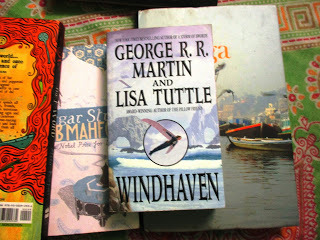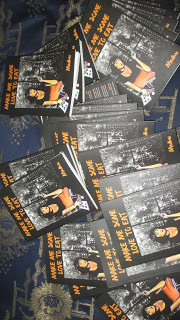Dibyajyoti Sarma's Blog, page 24
March 26, 2017
'I wanted a kick-ass heroine'
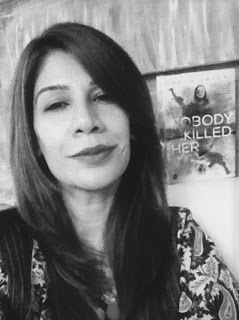 An edited version of the story first appeared in Sakaal Times, 26 March 2016
An edited version of the story first appeared in Sakaal Times, 26 March 2016
‘I wanted a kick-ass heroine who had no scruples when it came to getting what she wanted’
Sabyn Javeri, author of this year’s most sensational debut, and perhaps the most controversial, Nobody Killed Her, which cuts close to real-life political histories, explains the issues of gender and politics that informs her fiction
The ghost of Benazir Bhutto seems to hover over the book…
Benazir Bhutto was a larger than life inspirational figure and has probably influenced every Pakistani woman in some way or the other. While I did seek inspiration from her leadership qualities for character development, it was Leila Khalid who inspired the main plot hooks. One day at the Tate, I saw an exhibition on Leila Khalid, how she had had multiple cosmetic surgeries and no one knew what she looked like. The exhibition ended with the line that ‘Leila could be standing next to you and you wouldn’t know’. This triggered something in my brain and I thought about writing a story around a female politician who pulls every trick in the book to get what she wants. But I didn’t want to write another Godmother or Gulab Gang. I wanted, instead, to tell a much more intertwined journey of power of two women from contrasting backgrounds on the same uphill climb. I wanted to write a page-turner, crime caper, genre novel yet blow to smithereens the stereotypical portrayal of women in such books. I wanted a kick-ass heroine who had no scruples when it came to getting what she wanted. I wanted a hero, not a victim - and so the book’s narrator Nazo was born. It was her voice that I heard first and it was through her eyes I saw Rani Shah, her anti-thesis. Rani is a character in whom I have infused aspects of world leaders like Indira Ghandi for being the daughter of Nehru and carrying with her the automatic burden of a political legacy; Benazir Bhutto for being perhaps the only leader who was fabulously unapologetic about her family life while in office (she showed women that they could be mothers, wives as well as leaders in a man’s world); Aung San Sui for her perseverance during exile and also her tactile negotiations with the military in reviving democracy; Margaret Thatcher for her transition from politician to autocrat…
As the plot centers around the court trial of an assassination, some people automatically assume that like Mohammed Hanif’s ‘A Case of Exploding Mangoes’, it will debunk some sort of conspiracy behind the assassination. But at the end of the day, it is just a fictional exploration along the lines of Monica Ali’s ‘Untold Story’ about an alternative reality to the car crash of a Diana-like character or Robert Harris’s The Ghost about a Tony Blair-like character whose wife turns out to be an American spy (doesn’t mean Cherie Blair is one!). People want an Elvis is alive story because as you say, the ghost still hovers. However, I feel art should not be politicized. So let fiction be fiction. Readers will always be subjective.
You also mentioned that the book combines serious academic research and fictional imagination…
I didn’t do any research for the book itself but as I was looking for a topic for my dissertation, the idea of female leaders negotiating power in patriarchal societies became very appealing. So whether it was in politics or terrorist organisations, power politics became the springboard for my imagination. I was also inspired by the transcript of the JFK trial and the supposed trial of Leena Khalid, the Palestinian terrorist and liberator where the person in the dock turned out to be a decoy.
The themes I wanted to explore were more psychological than political. How do women get to a position of power and how do they hold on to it? What are the compromises they have to make and how do they compromise others? Power and ambition are dirty words when it comes to women but cherished in men. It’s this hypocrisy I wanted to expose.
I also wanted to debunk the myth of motherhood which I feel is in someways a social construct rather than a biological one. There is a line in my book where one of the characters say, ‘It’s not that I couldn’t give birth, I just chose not to become a mother.’
Along with women empowerment, I wanted to explore the idea of a woman not wanting it ‘all’. What if a woman got to the top but chose to give it all up. Can society allow world leaders such a concession? Isn’t that what true feminism is about? The right of a woman to choose whether she wants to be a mother, a homemaker, deal breaker or boardroom leader; it should be her choice- and that choice should be respected by those around her. A woman who chooses to be a housewife doesn’t deserve to be shamed just like a woman who goes to work while her husband or ayah looks after her kids should not be taunted.
These are the uncomfortable truths which I wanted to draw out.
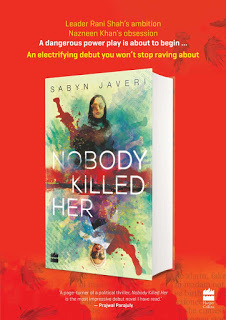 As I understood from the dedication, the book had a difficult path to publication. How so?
As I understood from the dedication, the book had a difficult path to publication. How so? Well, each editor has a different vision for the book, and initially yes, it focused too much on the assassination, which led to legalities. But there were other setbacks too, such as my agent and editor switching jobs, health problems and then the move between countries which made writing the least of my priorities. However I’m a firm believer of ‘what doesn’t kill you makes you stronger.’ I rewrote the book and today, it is a much stronger story!
I loved the first person ‘interior narration’ of the book – ‘I telling it to you’. How did it come about and how difficult was it to sustain that tone, Nazo’s voice?
I love the way you put it, ‘I telling you.’ That is exactly what I had in mind in the sense that I wanted the reader to be involved in the narration. As a writer, I believe that the way you tell a story is just as important as the story itself. The idea of an unreliable narrator, like Humbert Humbert in Lolita, or the mother in We Need to Talk about Kevin has always fascinated me. I didn’t want to put a straightforward story out there. I wanted the reader make up their own mind as to who was telling the truth in this book. I was attracted by the idea of the second person alternating as the first person, simply because it gave the readers a chance to take on the persona of Rani Shah as Nazo addresses her as ‘You’.
Sustaining the voice wasn’t difficult for me as I created different speech patterns for each character and also did character dossiers where I completely took on the persona of my characters. I know my poor editor, Minakshi Thakur, suffered a lot as the character of Nazo spoke such bad grammar! But as they say in the films, script ki demand thi.
You also did a creative writing course. Does creative writing help?
Well that’s a tough one. As a creative writer teacher, I am inclined to say yes, but at the end of the day whether writing can be taught, or more importantly learned, is debatable. I think writing is like any other sport — the more you practice the better you become. So whilst writing courses can’t really teach you how to become a good writer, they can certainly equip you with the skills of the craft.
I feel there are two kinds of writers, planners and discoverers. Writing courses often help you make that jump from being a discoverer, who meddles along as s/he writes to a planner, someone who is more organized in their writing and actually finishes the book. In that sense, they instill a discipline in you to sustain your writing practice.
Having said that, I didn’t write Nobody Killed Her in a writing course and the stuff I did, never got published. So that makes me wonder! However, the fact that I developed the stamina to write a novel was probably thanks to the training in the course.
In the genre of South Asian Writing, we now have a thriving sub-genre of Pakistani writing. Someone told me once, bad politics is fodder for good stories. Would you agree?
I think bad politics is a much more a worry of the West these days – what with Trump and May and Brexit and Frexit!
In Pakistan, ‘bad’ politics are not just limited to the parliament but unfortunately to the wider aspects of class and gender. We, in South Asia, have a troubled history thanks to our colonisers, who left us in such a mess and writers have always helped try to make sense of it in their writings. There was a phase where Pakistani writers seemed to be feeding into a western discourse about Pakistan as a completely unstable state teeming with terrorists reminiscent of Homeland, but I think with newer ‘home-grown’ writers who actually live in the country, all this is changing. There is a more holistic, more organic narrative coming out of Pakistan which is less about global politics and more about politics on the ground of class, gender and sexuality. In fact it’s not just about politics but actually about the people to whom politics happen, as art should be.
I think it’s a really exciting time to be a writer in the sub-continent as the kind of experimental and inventive work that is being done here is not something that the West would take a chance upon. This is partly thanks to the Indian publishing industry which is not prejudiced to nationality, gender or race, a good story being the only criteria to publishing.
But your story is more than politics, isn’t it? At one point, I was reminded of Thackeray’s Vanity Fair – a story of thwarted ambition.
That’s a really interesting comparison. Strangely, I had read Vanity Fair just a few years before writing Nobody Killed Her. I wonder now how much that subconsciously influenced me! Both books do have class and society at their heart and like Thackeray’s Vanity Fair, my novel too presents a world in which people are almost entirely defined by their gender and the socioeconomic rank within which they find themselves. Some, like Nazo, try to claw their way up and come crashing down; others like Rani Shah are thrust into power by fate; what remains constant is the characters’ strategising opportunism, and an excess of cold ruthlessness, that is needed to survive in a society seeped in patriarchy and hypocrisy. What makes it interesting is that there is a gap of almost two hundred years between the novels yet not much has changed for women- beneath the surface, the glass ceiling is firmly in place.
Without going to spoiler territory, I thought the book ended with a possibility of a sequel. Do you plan to continue the story?
Now, that’s an interesting question. It’s already stirred up so much controversy that I wonder what would happen if I did continue the story! However now, that you’ve put the bug in my head…
Anything else, you’d like add?
The response to Nobody Killed Her has been overwhelming. For me it’s been a life changing experience and has seriously challenged my cynical views about a writer’s role in society. I used to think art and politics don’t mix but now I’m inclined to agree with artiste Mickalene Thomas that the ‘act of making art itself is a political and feminist act - when you’re a woman’.
Published on March 26, 2017 23:57
March 17, 2017
Taking advantage of the noise surrounding Gurinder Chadha...
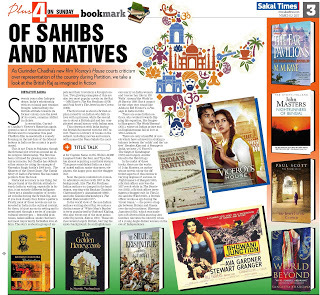 Taking advantage of the noise surrounding Gurinder Chadha’s Viceroy’s House, I made a list of popular novels set in the British Raj. The idea was to promote the works of John Masters, who, I think, is highly underrated. In Sakal Times, 12 March 2017
Taking advantage of the noise surrounding Gurinder Chadha’s Viceroy’s House, I made a list of popular novels set in the British Raj. The idea was to promote the works of John Masters, who, I think, is highly underrated. In Sakal Times, 12 March 2017
Published on March 17, 2017 09:12
March 1, 2017
Selected Poems Sananta Tanty
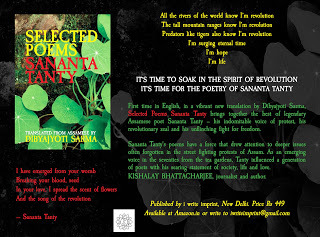 Proud to present our new book. Selected Poems Sananta Tanty; an ambitious and massive translation of legendary Assamese poet Sananta Tanty in English by Dibyajyoti Sarma. Now available @ http://www.amazon.in/dp/8192935531
Proud to present our new book. Selected Poems Sananta Tanty; an ambitious and massive translation of legendary Assamese poet Sananta Tanty in English by Dibyajyoti Sarma. Now available @ http://www.amazon.in/dp/8192935531
Published on March 01, 2017 04:38
February 19, 2017
Windhaven
Published on February 19, 2017 21:55
February 18, 2017
Sunday Book Report I/Diversity India, edited by Hilda Dav...
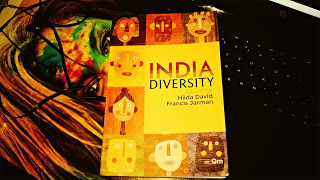 Sunday Book Report I/
Sunday Book Report I/Diversity India, edited by Hilda David and Francis Jarman, published by Om Books International, releasing today at 4 pm at Crossword Book Store, Phoenix Market City, Viman Nagar, Pune. Pune folks, do attend if possible.
I think the book, which takes a micro look at modern India from a diverse point of view, is important (and interesting) for our time. In any case, I am so proud of this book, as it gives me the opportunity to share space with friends and authors I cherish and admire. Discounting for me, the book indeed has an impressive list of contributors – Arshia Sattar; Arundhathi Subramaniam; Githa Hariharan; Jerry Pinto; Meena Kandasamy; Ramu Ramanathan; R Raj Rao, among many other others. Do check it out!
Published on February 18, 2017 23:04
January 10, 2017
I have my caveats against Indian Literature, the Sahitya ...
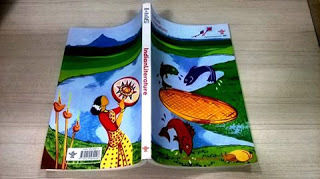 I have my caveats against Indian Literature, the Sahitya Akademi’s bi-monthly magazine. But this issue is such a gem, such a beauteous collection that I am ready to forgive them for everything. If you ever wanted to read a comprehensive collection of Assamese poetry in translation, this is the issue – No 295 (September-October 2016), a special issue on 21st Century Assamese Poetry featuring 30 poets, both established and young and it’s a fantastic list (though I could not but help notice some glaring omissions. There’s no Nabakanta Barua, no Ajit Barua, no Kabin Phukan, and most importantly, no Sananta Tanty, an omission I would take personally!)
I have my caveats against Indian Literature, the Sahitya Akademi’s bi-monthly magazine. But this issue is such a gem, such a beauteous collection that I am ready to forgive them for everything. If you ever wanted to read a comprehensive collection of Assamese poetry in translation, this is the issue – No 295 (September-October 2016), a special issue on 21st Century Assamese Poetry featuring 30 poets, both established and young and it’s a fantastic list (though I could not but help notice some glaring omissions. There’s no Nabakanta Barua, no Ajit Barua, no Kabin Phukan, and most importantly, no Sananta Tanty, an omission I would take personally!) But let’s not whine when there are such riches to celebrate. I am so happy to see so many young people translating Assamese poetry; it was a find.
There are 15 translators (yours truly included) and understandably one name towers over the rest – Pradip Acharya. He is our Dronacharya, teaching us the skills with tireless dedication. The other translators are Deep Baruah; Krishna Dulal Barua; DN Bezborua; Ramanandan Borah; Anand Bormudoi; Anil Boro; Bibekananda Choudhury; Kallol Choudhury; Rubee Das; Amitabh Ranjan Kanu; Tapati Baruah Kashyp; Jyotirmoy Talukdar; and Nirendra Nath Thakuria.
And the poets, starting with Nilamani Phookan? What a list! This is the royalty of Assamese poetry – Ajit Bharali; Ajit Gogoi; Anubhav Tulasi; Anupama Basumatary; Bibha Rani Talukdar; Bijoy Sankar Barman; Biman Kumar Daley; Bipuljyoti Saikia; Debaprasad Talukdar; Ganga Mohan Mili; Jiban Narah; Julie Boruah; Jyotshna Kalita; Kabita Karmakar; Kamal Kumar Tanti; Kushal Dutta; Lutfa Hanum Salima Begum; Manoj Barpujari; Mridul Haloi; Nibedita Phukan; Nilim Kumar; Nilima Thakuria Haque; Pratim Barua; Premnarayan Nath; Rajeev Barua; Rajib Borah; Ranjit Gogoi; Sameer Tanti and Saurav Saikia.
A momentous occasion!
Published on January 10, 2017 20:40
January 5, 2017
To make myself new, let me then open myself up, haphazard...
To make myself new, let me then open myself up,
haphazardly, impatiently, violently –
like a seven-year-old opens a birthday present.
Let me uproot my hair to reveal the skull beneath,
gouge my eyes, bend my nose, twirl my lips.
Or perhaps I should open myself up slowly,
like a 15-year-old opens her first gift
from her first boyfriend. She knows what’s inside
and cannot wait to see it. And if it’s something else?
Should she dump him, or may be pick up a fight –
As she unties the pink ribbon, let me shear my head.
With a paper cutter, let me draw
a bloody opening from the back of my neck to my nose
and then expertly hit the middle of my skull
the way a priest smashes a coconut before the idol
and examine the grey matters inside with the same excitement
of a fan girl finding herself alone with her silver screen idol.
(If only I had some fava beans and a bottle of Chianti
I could relive my Hannibal moment with myself!)
Then what? Probably I should leave the brain alone.
It’s old enough and nothing can be done about it!
haphazardly, impatiently, violently –
like a seven-year-old opens a birthday present.
Let me uproot my hair to reveal the skull beneath,
gouge my eyes, bend my nose, twirl my lips.
Or perhaps I should open myself up slowly,
like a 15-year-old opens her first gift
from her first boyfriend. She knows what’s inside
and cannot wait to see it. And if it’s something else?
Should she dump him, or may be pick up a fight –
As she unties the pink ribbon, let me shear my head.
With a paper cutter, let me draw
a bloody opening from the back of my neck to my nose
and then expertly hit the middle of my skull
the way a priest smashes a coconut before the idol
and examine the grey matters inside with the same excitement
of a fan girl finding herself alone with her silver screen idol.
(If only I had some fava beans and a bottle of Chianti
I could relive my Hannibal moment with myself!)
Then what? Probably I should leave the brain alone.
It’s old enough and nothing can be done about it!
Published on January 05, 2017 05:33
My six standard science teacher said,don’t listen to phil...
My six standard science teacher said,
don’t listen to philosophers, historians,
they are wrong, those losers, for
we may not matter, matter matters
and everything you create can never
be destroyed; forgotten maybe, it’s a
human limitation, but ether knows you
as you are, part of the cosmos –
and everything you do, everything
you say, your every word, your songs,
every second of your wondrous life
is stored in the vast hard disk of space.
It doesn’t matter if anyone else knows you,
the universe does and that’s enough.
don’t listen to philosophers, historians,
they are wrong, those losers, for
we may not matter, matter matters
and everything you create can never
be destroyed; forgotten maybe, it’s a
human limitation, but ether knows you
as you are, part of the cosmos –
and everything you do, everything
you say, your every word, your songs,
every second of your wondrous life
is stored in the vast hard disk of space.
It doesn’t matter if anyone else knows you,
the universe does and that’s enough.
Published on January 05, 2017 05:31
January 1, 2017
You planned to tame a swallow, to hold herIn the long sum...
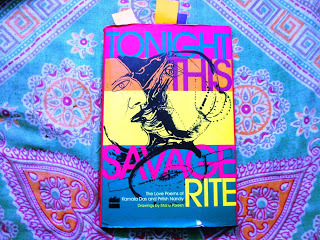 You planned to tame a swallow, to hold her
You planned to tame a swallow, to hold herIn the long summer of your love so that she would forget
Not the raw seasons alone, and the homes left behind, but
Also her nature, the urge to fly, and the endless
Pathways of the sky. It was not to gather knowledge
Of yet another man that I came to you but to learn
What I was, and by learning, to learn to grow, but every
Lesson you gave was about yourself. You were pleased
With my body's response, its weather, its usual shallow
Convulsions. You dribbled spittle into my mouth, you poured
Yourself into every nook and cranny, you embalmed
My poor lust with your bitter-sweet juices. You called me wife,
I was taught to break saccharine into your tea and
To offer at the right moment the vitamins. Cowering
Beneath your monstrous ego I ate the magic loaf and
Became a dwarf. I lost my will and reason, to all your
Questions I mumbled incoherent replies. The summer
Begins to pall. I remember the rudder breezes
Of the fall and the smoke from the burning leaves. Your room is
Always lit by artificial lights, your windows always
Shut. Even the air-conditioner helps so little,
All pervasive is the male scent of your breath. The cut flowers
In the vases have begun to smell of human sweat. There is
No more singing, no more dance, my mind is an old
Playhouse with all its lights put out. The strong man's technique is
Always the same, he serves his love in lethal doses,
For, love is Narcissus at the water's edge, haunted
By its own lonely face, and yet it must seek at last
An end, a pure, total freedom, it must will the mirrors
To shatter and the kind night to erase the water.
Kamala Das
Published on January 01, 2017 04:55
December 5, 2016
Now available at Amazon.in. Grab your copy now!
Published on December 05, 2016 02:08

